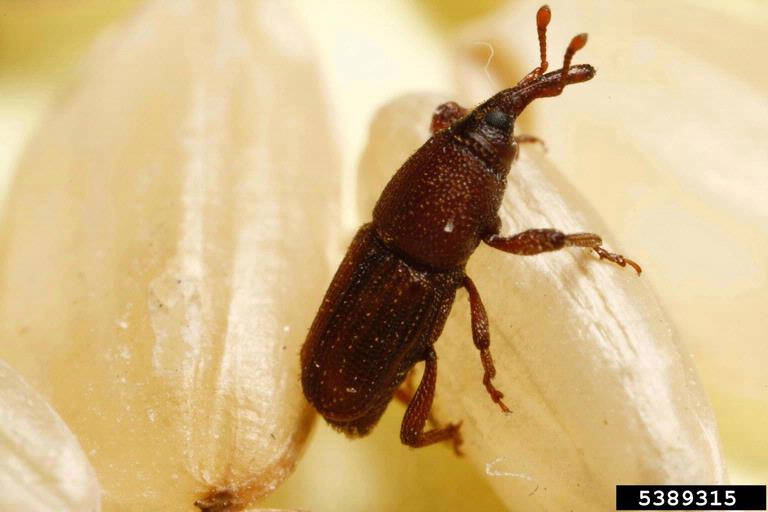August 23, 2016

The primary causes of grain spoilage during storage are excess moisture and high temperature. However, insects can infest any grain that is not handled properly or that is stored longer than 6 months.
Damage from weevils or other stored grain insects can be costly. Unfortunately, they often are discovered when grain is being taken out of the bin. At that point, the damage has been done and there are few control options.
The elements of pest prevention, the key to successful long-term storage are sanitation, protection, and inspection. Arguably, sanitation is the key because infestations of stored grain insects rarely begin in the field. They usually develop from small numbers of pests present in or around farm storage bins or in grain handling equipment. An effective sanitation program can greatly reduce the chance of having serious problems with these insects.
Harvesting should begin with empty, clean bins. Never put newly harvested grain into bins containing old grain. Remove any residual grain as thoroughly as possible using shovels, brooms and an industrial vacuum. Clear dust, webbing and fines from around any cracks and crevices, doors, seams, and vents.
Inspect clean bins and repair any cracks or holes that could allow moisture or insects to enter. Then, spray the inside of the clean, empty bins completely with a labeled residual insecticide. Apply a coarse spray to run-off at least two weeks before binning. Pay close attention to areas that might hide insects, such as under perforated floors and vents. Cracks around doors and vents may serve as entryways.
Thorough preparation also should include the area immediately around the bins. Remove and destroy any spilled grain. Clip tall weeds and grasses that can harbor spilled grain, insects, and rodent pests. Inspect outside walls, especially the base and roof for damage that could allow pests and moisture to enter.
Put only clean, dry grain into the bins. Most stored grain insects require 13% to 15% moisture for maximum feeding and reproduction. Clean grain that is likely to be held for more than 6 months. This reduces the chances for problems with pests like bran beetles that live on fines and produce metabolic heat and moisture that reduces the stored grain's quality.
Level the grain surface after the bin is full. Good airflow allows improved moisture and temperature control and easier access for inspection. Regular grain bin inspection provides important information on the general condition, temperature, and moisture. Early detection of an insect infestation allows quick response to deal effectively with it.
See Controlling Insects in Stored Grain https://entomology.ca.uky.edu/ef145 for more information.
You May Also Like




